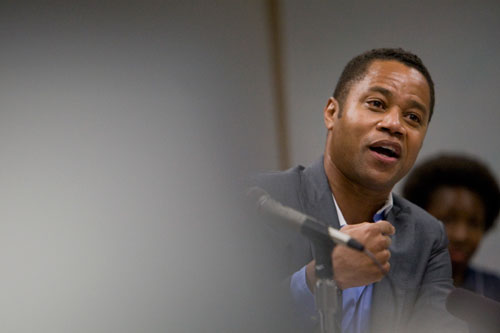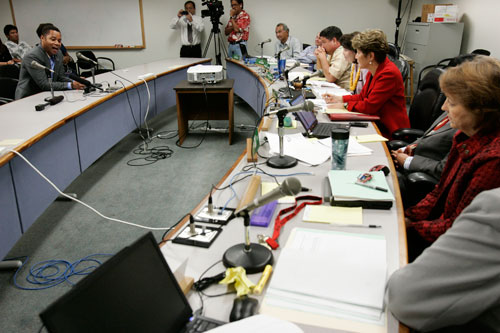Tax credit push draws star power

Actor Cuba Gooding Jr. testified yesterday for Relativity Media, which is seeking more tax breaks for television and movie production in Hawaii.

The proposal would increase the film production tax credit to 35 percent from 15 percent on Oahu and to 40 percent from 20 percent on the neighbor islands, with 5 percent bonuses for productions involving computer-aided special effects and animation.


No stranger to filming in Hawaii, actor Cuba Gooding Jr. told lawmakers yesterday he would like to film more movies in the islands and urged them to approve expanded tax breaks for production companies.
Gooding recalled filming "Outbreak" in the islands in 1992. "To me it’s exciting to think that I could come to someplace that was a childhood dream … and to film over here," Gooding told lawmakers.
Gooding testified at the request of Relativity Media LLC, one of two major Hollywood entertainment companies seeking additional tax breaks in Hawaii for television and movie production.
The proposal would increase the film production tax credit to 35 percent from 15 percent on Oahu and to 40 percent from 20 percent on the neighbor islands, with 5 percent bonuses for productions involving computer-aided special effects and animation.
The bill would also provide tax credits for new production facilities, rebates to help with a local crew training program, and exemptions from hotel room taxes for productions longer than 30 days.
The Senate Committees on Economic Development and Technology and Tourism deferred action on the bill until tomorrow. A House version advanced out of committee last week.
Don't miss out on what's happening!
Stay in touch with breaking news, as it happens, conveniently in your email inbox. It's FREE!
Senators had serious concerns that the bill had not been thoroughly vetted, noting drafting errors in the title and typos in some dates.
"This is a very intense bill," said Tourism Chairwoman Sen. Donna Mercado Kim (D, Kalihi Valley-Halawa). "It’s just fraught with issues and problems."
The state Department of Taxation estimates the state’s revenue loss from the bill at $46.3 million a year, a figure supporters believe would be offset by revenues from additional film and television productions.
Although his agency supported the intent of the bill, Richard Lim, acting director of the Department of Business, Economic Development and Tourism, said the agency had not had enough time to thoroughly review it.
Economic Development and Technology committee Chairwoman Carol Fukunaga (D, Lower Makiki-Punchbowl) urged all parties to go over the bill before tomorrow.
"At the end of the day, it’s a very big bill, it’s a very big measure and it’s really hard to describe how to change an entire industry," said Ryan Kavanaugh, chief executive officer and founder of Relativity Media.
Kavanaugh, whose company was behind such films as "300" and "Mamma Mia," said Relativity produces 20 to 30 films a year, many of which could move production to Hawaii if the bill were enacted.
Relativity and Shangri-La Industries have said they would commit to environmentally friendly, state-of-the-art production facilities that could lure more films and television shows, create jobs and bring additional economic development to the islands.
Companies have argued the state needs to increase its film tax incentives to remain competitive with production hubs in states such as Louisiana, Michigan and New Mexico, as well as foreign locales such as Canada and eastern Europe.
In addition to Gooding, the measure received written testimony in support from former President Bill Clinton, while native Hawaiian actor Branscombe Richmond testified in person, saying he was in favor of anything that would promote film industry jobs in Hawaii.
"I don’t see any other industry that’s coming to Hawaii that wants to build," said Richmond, who played Bobby Sixkiller in the 1990s TV series "Renegade."
"Toyota’s not coming. GM’s not coming. Who’s coming?" he added. "How do we train kanakas to work? Right now Wall Street doesn’t even know what a Hawaiian looks like. That’s the problem."



